Home > Best CPUs > Bottlenecks Guide
What Are CPU Bottlenecks? (& GPU)
How to Identify and Fix the Bottlenecks in Your Gaming PC's Performance
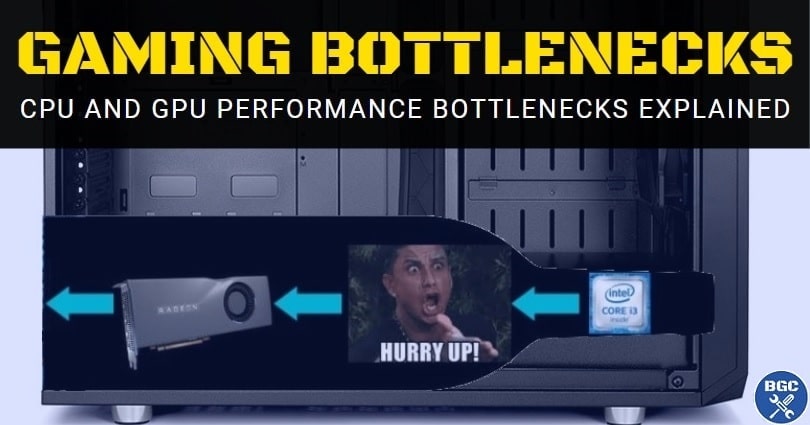
Confused about CPU and GPU bottlenecks? You're not alone. When it comes to PC hardware, performance bottlenecks are commonly asked about, but thanks to lots of conflicting information and misleading advice floating around online, it's an often misunderstood and misinterpreted topic as it's a nuanced subject that depends on context.
Common questions along the lines of "will component X bottleneck component Y" can't always be answered with a simple yes or no, since there are multiple factors that determine whether or not you'll encounter a bottleneck with a particular combination of CPU and GPU. The specific games you play has a big say in whether or not your setup will have a bottleneck, and so does your frame rate (which also then naturally includes screen resolution into the conversation as well, since higher resolutions mean lower frame rates).
See Also: Best CPU GPU Combos to Avoid Bottlenecks
What is a CPU Bottleneck?
Before defining a CPU bottleneck, let's first set the scene by defining performance bottlenecks in general for anyone who's not familiar with the term.
When it comes to computers, a bottleneck is a component within the system that is effectively the weakest link that holds back another component from performing at its maximum potential. When choosing parts for a PC build or upgrade, bottlenecks are something to be aware of if you want to ensure you get the fastest performance for your particular usage.
So, having defined bottlenecks in general, a CPU bottleneck is exactly as it sounds: when the CPU in your computer is weak relative to the performance of the other components (mostly the GPU) that it holds back the performance of the system as a whole.
More specifically, a gaming PC has a CPU bottleneck if the CPU cannot process the data for each frame fast enough relative to how fast the GPU can render those frames. This consequently caps your frame rate below its full potential, and can lead to subpar FPS (Frames Per Second) at best, or very noticeable (or even unplayable) stutters or slowdowns in frame rate at worst.
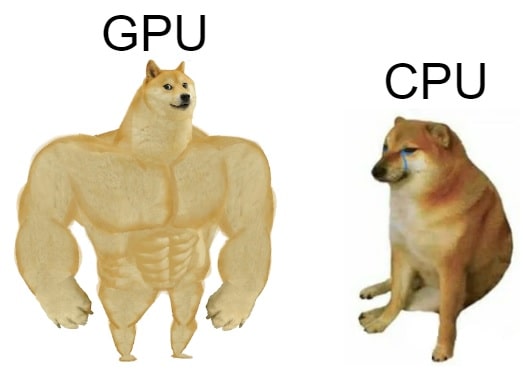 Highly professional representation of a CPU bottleneck in action
Highly professional representation of a CPU bottleneck in actionHow CPU Bottlenecks Work in Games
Let's look more closely at how a CPU bottlenecks a GPU. When running a game, the CPU and GPU are responsible for different types of calculations. In a nutshell, the CPU processes the gameplay to prepare a frame to be rendered by the GPU. This can include anything such as calculating and processing AI (Artificial Intelligence), physics, collision detection, player input, character and NPC movement, networking (ie multiplayer), scripting, and anything else unrelated to the rendering process.
Once the CPU is done with its calculations and has prepared a single frame for rendering, the CPU passes geometry data to the GPU for it to render on-screen. Once a frame is rendered, the cycle repeats for the next frame. The faster your CPU, the faster this cycle can repeat, and the higher your frame rate (assuming your GPU can keep up).
When your CPU is bogged down with a lot of processing that it cannot complete fast enough (either because your CPU is too weak for that particular game, or that particular game is CPU intensive or poorly optimized) it can hold up the GPU which actually sits in idle to various degrees (until the CPU is ready to deliver a frame). This is a CPU bottleneck in action - the GPU cannot render as many frames as it could if it were paired with a faster CPU.
Another way to think about it is as follows:
- A CPU is capable of processing a certain amount of FPS depending on the game. This is basically that CPU's maximum potential FPS - the better the CPU, and the less CPU intensive the game is, the higher the potential FPS.
- A GPU also has a certain amount of FPS it can render depending on the game, resolution, and in-game graphics settings. Again, this is basically that particular GPU's maximum potential FPS.
- When your PC doesn't allow your GPU to reach its maximum potential FPS - which happens when your CPU's maximum potential FPS is LESS than your GPU's maximum potential FPS - that is when your PC encounters a CPU bottleneck.
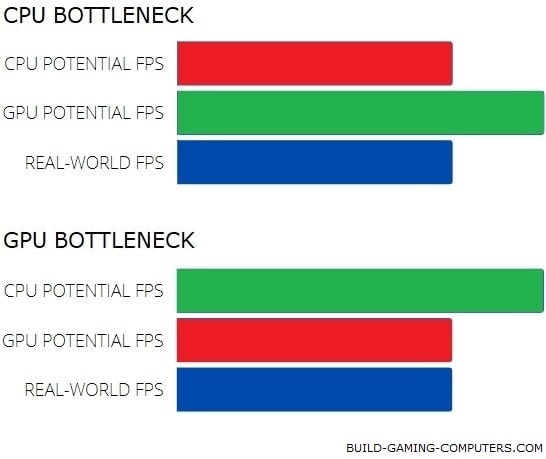
To hammer the point home further let me explain it yet another way, which may be the 'aha' moment that clicks for you (for those who are perhaps still understandably confused).
Let's say your particular CPU is capable of 150FPS in a certain game. No matter which resolution, it'll be capable of that 200FPS since resolution does not affect the CPU (at least not indirectly).
Now, your GPU is also capable of a certain FPS "ceiling", but the resolution does impact that. So let's say your GPU is capable of 200FPS at 1080p, but only 80FPS at 4K.
- At 4K, you'll only see 80FPS, despite your CPU being capable of 150FPS (a GPU bottleneck).
- At 1080p, you can see up to 150FPS, but your GPU is capable of 200FPS (a CPU bottleneck).
This is why you hear people say that 1080p is CPU bound/intensive, and 4K (or even 1440p) is GPU bound/intensive. The latter is definitely true in any modern 3D game, but just be aware that the former is not necessarily always true, as you can definitely still be GPU-bound at 1080p in graphically demanding games.
For yet another way to look at this, Emerald_Flame, a mod from Reddit's BuildAPC community, made this great analogy that I could not have put better myself:
"So imagine that the CPU is a professor assigning papers, and the GPU is the student who has to write them.
1080p is like the professor assigning a 5 paragraph open ended essay. No big deal, quick and easy for the GPU to complete. Give it back to the professor to grade and say "Okay done, give me the next assignment". This means the professor has to grade really frequently and have new prompts ready to go just about every class period, if not more often.
4k is like the CPU/professor assigning a 25-30 page in-depth research paper. It takes the GPU/student A LOT longer to complete something of that scale, so the professor doesn't have to grade nearly as much, and doesn't need to hand out new prompts very often because that one takes so long to complete.
This is how CPU/GPU work together to build the world. The CPU basically says "hey I need you to make this world", the GPU renders and says "Got it, next please", and then it repeats. If the GPU takes longer amount of time before it asks for the next frame, the CPU has to give less instruction."
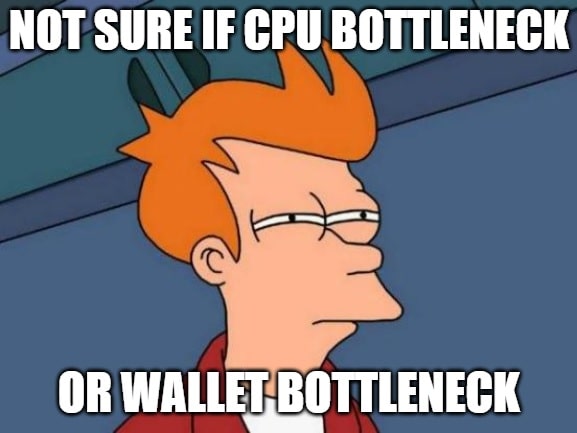
Why GPU Bottlenecks Are Better (& Normal)
If a CPU can bottleneck a GPU, you may wonder if the reverse can also be true. Can a GPU bottleneck a CPU? Technically, a slow GPU will not negatively affect the performance of a CPU (game engines have a processing flow of CPU->GPU, and not the other way around).
However, a GPU bottleneck is definitely a thing - it's simply when the GPU is the ceiling to your system's performance. In other words, when your FPS is limited by the GPU.
A GPU bottleneck is what you want your system to have, because no computer is without a bottleneck of some sort. Think about it: it's impossible to NOT have a bottleneck of some sort - your PC's performance has to stop somewhere (infinity FPS sounds cool, but we live in a world of physics).
And when it comes to gaming, since modern games are generally much more reliant on GPU power than CPU power, it's much better to be limited by your GPU rather than your CPU.
Does CPU Matter at High Resolutions? (1440p, 4K, VR)
The resolution of your monitor can affect CPU usage, but it does so indirectly (so perhaps not in the way you might think). The CPU calculates and prepares each frame for the GPU to then render, and in most games it will take the CPU the same amount of time to prepare each frame no matter what the screen resolutions is.
So let's say it takes 7ms (milliseconds) for the CPU to prepare a frame at 1080p. At 1440p and 4K, in most games it will also take the CPU 7ms. But here's the kicker: at higher resolutions, it takes the GPU longer to render each frame, meaning you get a lower frame rate. We all know that, but the point is, with a lower frame rate your CPU doesn't have to process as many frames, meaning lower CPU usage.
When you hear people say that CPU doesn't matter as much for 1440p or 4K, you can safely assume they are referring to 60Hz gaming, which doesn't require a high-end CPU as you only need to hit 60FPS. There's also the fact that at 1440p/4K 60Hz, since there are so many pixels to render, your frame rate will be decided by your GPU (at least in most games).
In other words, the bottleneck of your gaming PC at higher resolutions is almost always going to be the GPU, meaning that the difference in FPS between a mid-range CPU and a high-end CPU at high resolutions like 1440p or 4K is minimal at best (and often near non-existent). For 1440p 144Hz or 4K 144Hz gaming monitors, your CPU requirements are higher though, so in those cases saying that your CPU doesn't matter much at high resolution would not be accurate.
Refresh rate dictates your CPU requirements - not resolution.
That said, in the most CPU intensive games out there, you would still need to pay close attention to your CPU choice with 60Hz screens if you want to hit 60FPS consistently - though unlikely since most modern games tend to be GPU-bound, it's entirely possible to encounter a CPU bottleneck at 1440p/4K 60Hz.
As for VR gaming, where the best VR headsets have a similar (or higher) resolution as compared to 4K monitors, you are also almost always going to be GPU-bound (ie bottlenecked by the GPU, which remember is totally fine). That said, in general, VR can be a little more CPU intensive than regular flatscreen gaming, especially in titles with a lot of complex physics interactions or background processing such as racing sims, Microsoft Flight Simulator 2020, and Boneworks to name just a few.
How to Check for CPU Bottlenecks
To know whether your gaming PC has a CPU bottleneck or a GPU bottleneck, download a hardware monitoring program such as the popular MSI Afterburner which allows you to view CPU and GPU usage while gaming (for anyone new to hardware, no, you don't need an MSI motherboard/GPU - it works with all brands).
If using MSI Afterburner as I recommend, open it up and click on this gear icon in the middle to access the settings:
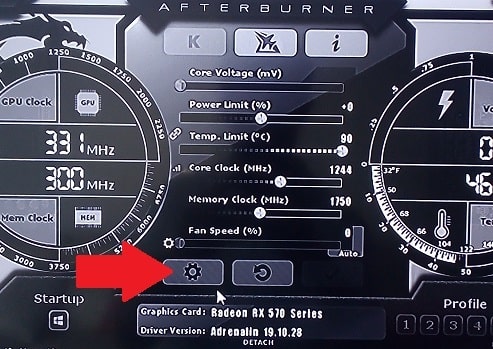
Then, click on the Monitoring tab at the top.
Then tick or untick the statistics that you want to show up on-screen while you're gaming. For checking bottlenecks, you will want to tick GPU usage, as well as CPU usage for all the cores that your CPU has. So for example, if you have a 6 core CPU like a Ryzen 5 3600, tick the first 6 CPU usage boxes. For 8 core CPUs, make sure you have 8 boxes ticked, and so on.
Finally, once you've ticked everything you want to show on-screen (you may also want to tick frame rate and average frame rate as these are always useful to know) don't forget to click Apply at the bottom.
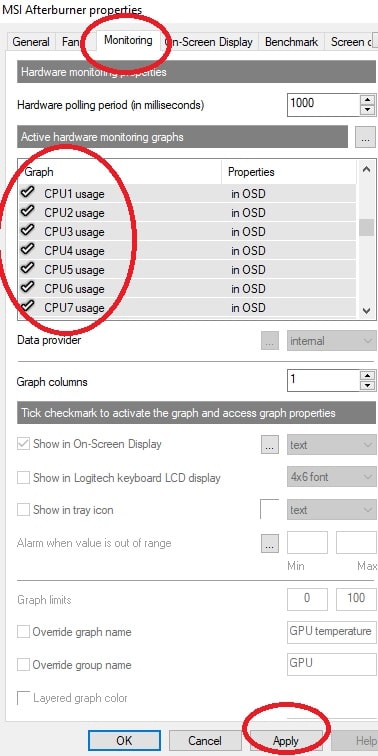
To determine if you have a CPU bottleneck, you actually want to first look at your GPU usage to first check whether or not you have a GPU bottleneck (if you have a GPU bottleneck, you can confirm that you don't have a CPU bottleneck).
Load up a game and run some gameplay (don't test things when just sitting in the menu as your CPU and GPU isn't being fully utilized). Look at your GPU usage - if it's often high around 95% to 100% that means it's being utilized near to its full capacity (which is what you want) and it's safe to assume you have a GPU bottleneck (and therefore not a CPU bottleneck).
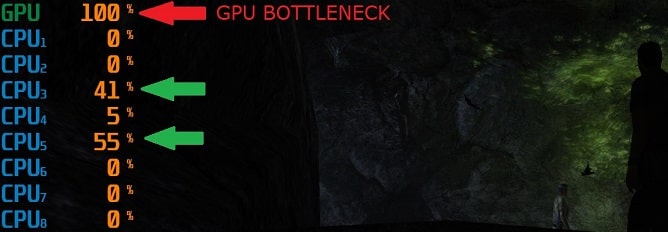 What a GPU bottleneck can look like (if you can guess which classic game I tested here you win the internet)
What a GPU bottleneck can look like (if you can guess which classic game I tested here you win the internet)But if GPU usage does not stay up high around 95% to 100%, chances are you have a CPU bottleneck on your hands (though you can't rule out a RAM bottleneck as they can happen too). Just keep in mind that low GPU usage doesn't always mean you have a CPU bottleneck, as you could just be running a non-demanding game that your particular system can easily handle.
Related: How to Show FPS in Games
To confirm you have a CPU bottleneck, look at the CPU usage of all your cores. If one of them hovers at very high usage, say 95% to 100% usage, that's a telling sign you have a CPU bottleneck. However, it's important to keep in mind you can still have a CPU bottleneck when CPU usage is not showing anywhere near 100%.
This is why relying on GPU usage first and foremost is the easiest and simplest way to rule out a CPU bottleneck - and if your GPU usage is lower than expected (constantly under 95%), you can often safely assume it's a CPU bottleneck.
CPU Bottleneck Fixes (Reducing CPU Load)
For the most part, you can't get rid of a CPU bottleneck without upgrading to a faster CPU. That said, there are things you can try that may potentially reduce CPU usage (therefore reducing the game's reliance on the CPU).
First of all, you can increase resolution within the game settings (if it has that option) - that will increase GPU usage, which can also actually reduce CPU usage too as explained earlier (your frame rate will be lower at higher resolutions, meaning less frames to calculate and prepare for the CPU and therefore lower CPU usage).
Also, in some games, lowering certain in-game video settings may actually lift some CPU load. For example, shadows can be processed by either the CPU or GPU depending on the game engine's specific implementation, so depending on the specific title lowering shadows may help.
Lowering visibility, draw distance, or FOV related settings can also slightly reduce CPU usage, since there may be less objects to process and calculate within the scene. Same thing with settings that relate to the amount of objects, units, characters, NPCs, and so on - these can reduce CPU usage. For example, lowering the crowd density setting in Cyberpunk 2077 is well known to free-up your CPU a little.
Lastly, if you have a CPU bottleneck and are trying to reduce CPU usage, remember to close any or all background applications when gaming to allow your CPU to be used to its maximum capacity when gaming. You could also overclock your CPU if you're more serious about gaining some extra FPS, but make sure your CPU cooler is good enough to do so otherwise things can get too hot.
GPU Bottleneck Fixes (Reducing GPU Load)
You can't "fix" a GPU bottleneck, nor do you need to. If you upgrade to a better GPU, you'll still be bottlenecked by the GPU, albeit with higher FPS. As explained earlier, a GPU bottleneck is what you want your gaming PC to have. But in certain situations, a GPU bottleneck can be something you want to try and minimize - if you have a setup with a strong CPU and a weak GPU by comparison, you may want to lighten the load on your GPU to squeeze out more performance.
Let's say you're holding out on buying your dream graphics card until you can save up more money, and you build a PC with a very good gaming CPU, say a Ryzen 5 5600X. You then seek out the cheapest graphics card you can find as a temporary "stopgap" solution, and grab a GT 1030 (or even a GT 710 if you don't plan to game at all until you can get your dream card).
A CPU GPU combo like this (5600X + GT 1030/710) will lead to a severe GPU bottleneck where your CPU is powerful enough to handle high frame rates, but your GPU is so far off the mark in terms of power that your frame rate is going to be majorly bottlenecked by the GPU.
If you want to "fix" this type of extreme GPU bottleneck, or at least alleviate it as much as possible (since you can't get rid of it without a GPU upgrade), lower the screen resolution as much as is comfortable. So if you're gaming on a 1080p monitor, in the game's settings menu, look to downscale the resolution to 720p or 900p, and make sure all graphics settings are set to low as well which can further lower reliance on the GPU. Doing so should gain you some extra FPS.
Related: How to Check GPU Temperatures
Read Next: Choosing the Best CPU GPU Combo to Avoid Bottlenecks
Trusted VPN
VPN software can be important in this day and age, especially if you do lots of online banking and/or use public WiFi whilst travelling. Having a VPN adds an extra layer of security to your PC or laptop when online to help protect your data, passwords, financials, etc from hackers or malicious programs. It can also let you access region-locked content (eg US Netflix from overseas). For gamers their can be even more benefits to using a VPN.
Because they're so popular these days, there are countless VPN providers, and it can be confusing to pick one. If you want my 2 cents, after a lot of research I decided on NordVPN 'cause it's one of the fastest, most reliable VPNs for both gaming and general use, with a lot of credible reviews out there backing that up. They also quite often run very solid deals.
Popular Articles (see all)
Search the Site
About the Author (2025 Update)
I'm an indie game developer currently very deep in development on my first public release, a highly-immersive VR spy shooter set in a realistic near-future releasing on Steam when it's ready. The game is partly inspired by some of my favorites of all time including Perfect Dark, MGS1 and 2, HL2, Splinter Cell, KOTOR, and Deus Ex (also movies like SW1-6, The Matrix, Bladerunner, and 5th Element).
Researching, writing, and periodically updating this site helps a little with self-funding the game as I earn a few dollars here and there from Amazon's affiliate program (if you click an Amazon link on this site and buy something, I get a tiny cut of the total sale, at no extra cost to you).
Hope the site helps save you money or frustration when building a PC, and if you want to support the countless hours gone into creating and fine-tuning the many guides and tutorials on the site, besides using my Amazon links if purchasing something, sharing an article on socials or Reddit does help and is much appreciated.

